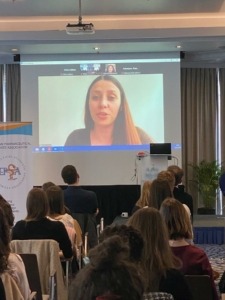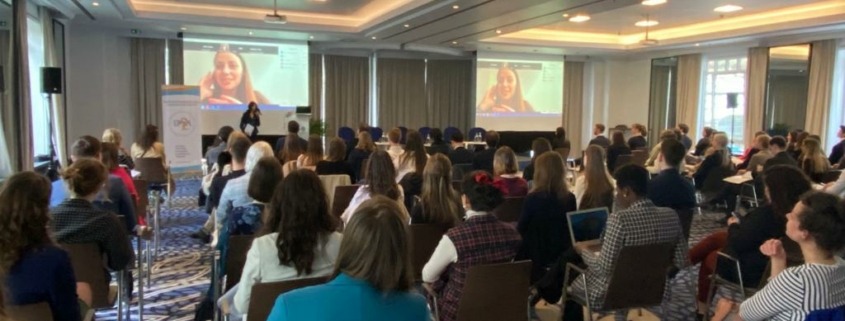On Tuesday, 15 March, MEP Irena Joveva hosted another annual reception of the European Pharmaceutical Students’ Association (EPSA) at the European Parliament. This year, the meeting with this international organisation focused on skills and education for transforming health education. The participants discussed the impact of COVID-19 on young people and the need to upskill health professionals in the light of changing circumstances, especially in the context of increasing antimicrobial resistance, the high incidence of cancer and the growing need for vaccine development, disease management and related research and innovation.
In her opening address to the 12th EPSA meeting, the MEP began by underlining the serious impact that the pandemic has had on young people in particular: “With the imposed curfews and closures, the pandemic has hit young people hard in various areas, including employment, the socio-economic sphere, education and mental health. With respect to the latter, numerous studies carried out in the EU have observed a sharp increase in rates of depression, anxiety and loneliness. Mental health issues and social exclusion, which young generations are increasingly facing today, can have a profound and long-lasting impact on their lives.”
 The European Year of Youth will, among other things, bring a new European Strategy for Universities, which will allow for better opportunities for education, but also its transformation, since it will no longer focus only on the acquisition of relevant knowledge, but also on the development of new skills. “Favourable environments for education, research and innovation enable the development of high-level skills, the creation of breakthrough knowledge and its translation into practice. The green and digital transitions require the education, research and innovation of tomorrow, which is why we need to reduce the digital skills gap within the EU,” said Joveva, who believes that we also need to regulate vocational retraining and upskilling to meet new and emerging needs in society and the labour market.
The European Year of Youth will, among other things, bring a new European Strategy for Universities, which will allow for better opportunities for education, but also its transformation, since it will no longer focus only on the acquisition of relevant knowledge, but also on the development of new skills. “Favourable environments for education, research and innovation enable the development of high-level skills, the creation of breakthrough knowledge and its translation into practice. The green and digital transitions require the education, research and innovation of tomorrow, which is why we need to reduce the digital skills gap within the EU,” said Joveva, who believes that we also need to regulate vocational retraining and upskilling to meet new and emerging needs in society and the labour market.
Joveva noted that public health is not only threatened by the pandemic, but also by the lack of effective health promotion and disease prevention, the rise in non-communicable diseases, cancer and mental illness, as well as the spread of antimicrobial drug resistance, the emergence of epidemics of infectious diseases, and increased pollution of the environment. It is therefore important to develop a knowledge acquisition plan that will enable health professionals to find multidisciplinary, intersectoral and international solutions to tackle diseases.
“The European Union needs to create an environment to bring together the skills of academics, clinicians, regulators and industry, and foster their collaboration with health services, social services, patients, policy-makers and citizens to leverage public funding and deliver results in both clinical practice and health systems.”
 The MEP believes that the European Health Union, the foundations of which have already been laid, will strengthen both disease surveillance and preparedness. The European Medicines Agency and the newly created European Health Emergency and Preparedness Authority (HERA) will also serve to support research and innovation to develop new medicines, address market challenges and strengthen industrial capacity, as well as to tackle challenges related to the availability and distribution of medicines. Most importantly, it will strengthen knowledge and skills in all aspects of public health countermeasures in all Member States.
The MEP believes that the European Health Union, the foundations of which have already been laid, will strengthen both disease surveillance and preparedness. The European Medicines Agency and the newly created European Health Emergency and Preparedness Authority (HERA) will also serve to support research and innovation to develop new medicines, address market challenges and strengthen industrial capacity, as well as to tackle challenges related to the availability and distribution of medicines. Most importantly, it will strengthen knowledge and skills in all aspects of public health countermeasures in all Member States.
“As pharmacy students, you have chosen a profession that has played a vital role in mitigating the COVID-19 pandemic. Without pharmacists, there would be no vaccines and medicines to help us overcome various diseases. You play an extremely important role in society and we as policy-makers will do everything we can to create an environment in which you can thrive,” she concluded.





Leave a Reply
Want to join the discussion?Feel free to contribute!